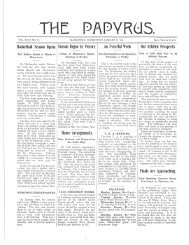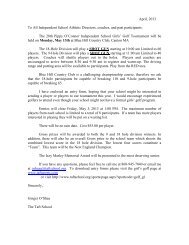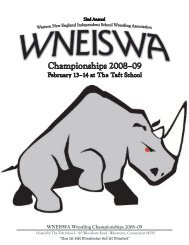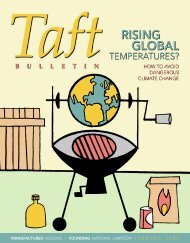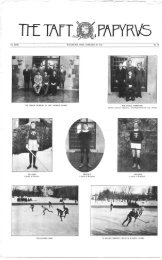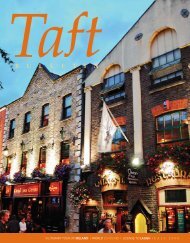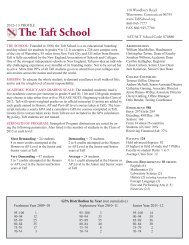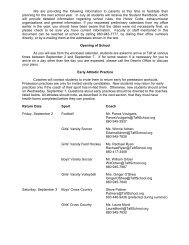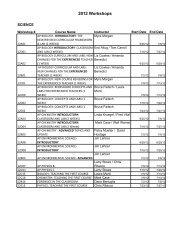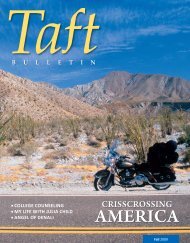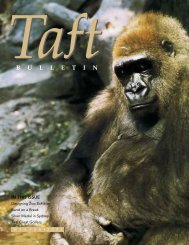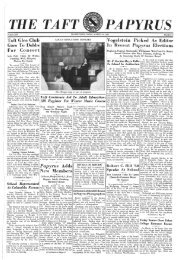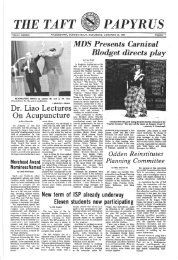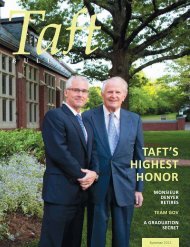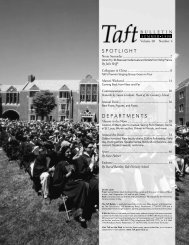By Lauren Henry '99 - The Taft School
By Lauren Henry '99 - The Taft School
By Lauren Henry '99 - The Taft School
- No tags were found...
Create successful ePaper yourself
Turn your PDF publications into a flip-book with our unique Google optimized e-Paper software.
E N D N O T E<strong>The</strong> Character of Community<strong>By</strong> <strong>Taft</strong> Chaplain Michael E. C. SpencerLet me begin with a story.This is the story of the rabbi’s gift. 1Once upon a time there was a monasterythat had fallen upon hard times. At onetime this monastery was one of manymonasteries run by a great order, but theantimonastic persecution of the 17th and18th centuries, and the rise of secularismin the 19th, had caused many of the othermonasteries to close until only this onemonastery was left. At one time, therewere 400 monks living there. Now therewere only five. Five old monks all overseventy years of age: one abbot, the leaderof the community, and his four brothermonks. <strong>The</strong>re was no doubt about it. Thiswas a dying order, and as soon as thesemonks were gone, there would be nomonastery, no sanctuary, left.In the deep woods surrounding themonastery there was a little hut. Andinside that little hut there lived a rabbiwho would often come to the woods topray. Through their many years of prayerand contemplation, the monks could alwayssense when the rabbi was in the hut.“<strong>The</strong> rabbi is in the house, the rabbi is inthe house,” they would whisper to eachother. <strong>The</strong> abbot, agonizing over the immanentdeath of his order, decided that hewould make a visit to the woods to ask therabbi if he could give any advice whichmight help save the monastery.And so, the abbot set off into thewoods, and when he came to the hut, therabbi welcomed him in. <strong>The</strong> abbot explainedwhy he had come, and the rabbicould only commiserate with him, “I knowhow it is,” he said. “<strong>The</strong> spirit has goneout of the people. It is the same in mytown. Almost no one comes to the synagogueanymore.” So the old abbot and theold rabbi sat and wept together. <strong>The</strong>nthey read parts of the Hebrew Bible, theTorah, and quietly spoke of deep things.<strong>The</strong> time came when the abbot hadto leave. <strong>The</strong>y hugged one another. “I amglad that we finally met after all theseyears,” the abbot said, “but I have stillfailed in my purpose for coming here.Isn’t there anything you can tell me, somepiece of advice that you can give me tohelp save my dying monastery.”<strong>The</strong> rabbi sighed. “No, I am sorry,”he said. “I have no advice to give. <strong>The</strong>only thing I can tell you is that theMessiah is one of you.”When the abbot returned to the monasteryhis fellow monks gathered aroundhim. “Well, what did the rabbi say?” <strong>The</strong>ywere all eager to know. “He couldn’t help.”<strong>The</strong> abbot answered. “We just wept andread the Torah together. <strong>The</strong> only thing hedid say, just as I was leaving—it didn’t makeany sense—he said that the Messiah is one ofus.” <strong>The</strong> monks looked puzzled. What didthat mean. <strong>The</strong> Messiah is one of us?Days and months followed, and themonks thought about the rabbi’s words.<strong>The</strong> Messiah is one of us? Could he actuallymean one of us monks here at themonastery? If so, then which one? Couldhe mean the abbot? Yes, if he meantanyone, he probably meant father abbot.He has led us for more than a generation.But he could have meant Brother Thomas.Brother Thomas is a holy one. Everyoneknows it, his eyes sparkle with thelight of God. But he couldn’t have meantBrother Simon. Simon is pretty annoying;but when you think about it, Simonis usually always right. Often very right.Maybe the rabbi did mean Brother Simon.But definitely not Brother Phillip. Phillipis so quiet, a real nobody. But then, almostmysteriously, he has a gift for somehowalways being there when you need him.He just magically appears by your side.Maybe Phillip is the Messiah. <strong>The</strong> rabbicouldn’t have meant me. He couldn’tpossibly have meant me. I’m just an ordinaryperson. Yet supposing he did? SupposeI am the Messiah? O God, not me.What a joke that would be. I couldn’tmean that much for you, could I?<strong>The</strong>se were the thoughts that eachmonk pondered over. And as they contemplatedin this way, the monks beganto treat one another with extraordinaryrespect on the off chance that one ofthem might be the Messiah. And on theoff, off chance that each monk himselfmight be the Messiah, they began to treatthemselves with extraordinary respect.Because the forest around the monasterywas very beautiful, many people stillcame to visit and picnic on the lawns,wander along its paths, and now and then gointo the dilapidated chapel to meditate. Asthey did this, without even noticing, theysensed the aura of extraordinary respect thatseemed to surround the five old monks andseemed to radiate out from them and fill theatmosphere of the whole monastery. It waspeaceful, and soothing, and attractive, andin the midst of their rushed and hurriedlives, the people seemed drawn to it. Hardly28 Fall 1999



